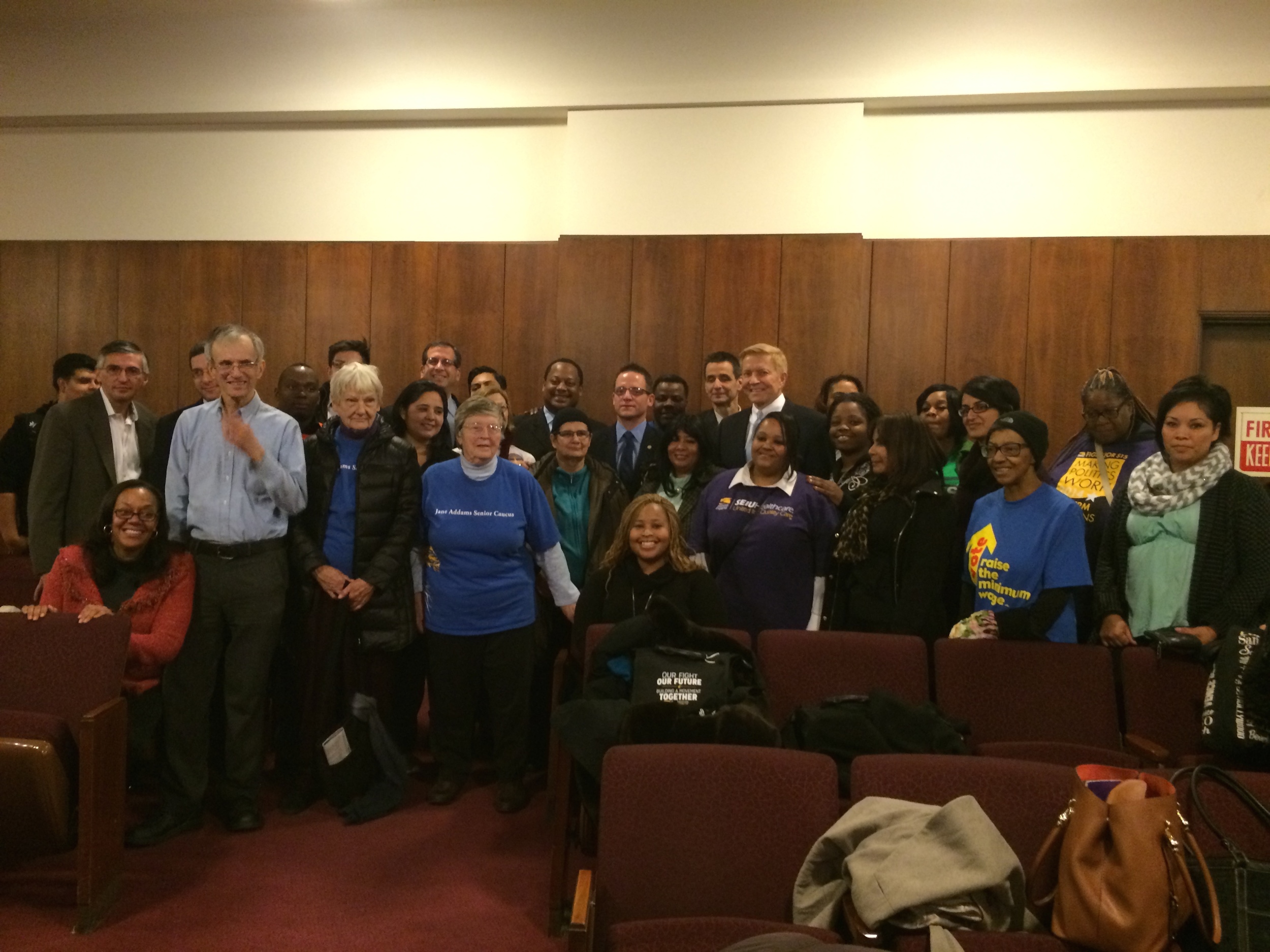$13 DOLLAR MINIMUM WAGE ORDINANCE
Jane Addams, along with other organizations in Raise Chicago, collaborated to increase the minimum wage in Chicago. The $13 dollar ordinance was passed, thanks to the time and dedication of the coalition.
Leaders, aldermen, and staff posing for a celebratory picture after the $13 dollar ordinance was passed.
July 1st 2015 marks the first increase to the minimum wage to $10 dollars an hour. We want to celebrate the increase, but also remind everyone that we are still fighting for $15! Although we won $13, the fight is not over! When the minimum wage reaches $13 in 2019, it will only be a few cents above the poverty line.
Jane Addams wants to highlight a few stories of our leaders who worked their whole lives, yet it was still not enough to live in retirement. Their circumstances have forced to work even after retiring and that's not right! Retirement should not be a luxury, but a right!
"we can't do labor intensive jobs"
Luella Barnett, a housing leader at Jane Addams, has worked her whole life. She was a receptionist for 29 years. She was able to save a small amount of money for retirement. However, her mother became very sick and required 24-hour care at home. One of her caregivers was paid by state, and Luella paid the other caregiver from her savings. On the weekends she was the one who took care of her mother. She spent all of her savings taking care of her, which left her with nothing for retirement. As a receptionist, she didn’t make enough money to save a sufficient amount for retirement. Without a college degree, her options for employment were limited.
Once she became a senior everything changed. She thought being a senior would make her life easier. “You think it’s going to be easy, but it’s actually harder.” Once she retired, Luella realized she was going to have to go back to work. Social Security was not enough to cover all of her expenses. “Okay, what am I going to eat today, I think I’m going to have to get the medicine and leave the food… so I said, I have to go back to work, because I can’t go without eating.” Jobs for seniors are limited, but her necessities forced her to go back to work. A limousine company that required her to stand for long periods of time and carry luggage, hired Luella. The job was physically demanding, which was hard for Luella. “We can’t do labor intensive jobs.” She had to leave the company to maintain her health. She retired again, but the need to cover groceries and medications forced her to look for another job. She began working for “tips only” in a women’s bathroom, but she was rarely tipped so her search for a steady job continued. The third time, she went back to work as a homecare worker taking care of other seniors. She makes $10 dollars now, which is still not enough. Luella always has to stay within her budget to make ends meet.
Seniors like Luella deserve to retire with enough income to live a healthy and fulfilling life. Retirement should not be a luxury, but a right! “It’s important to raise wages now, so workers can save for retirement and be able to survive.” It’s not right that seniors like Luella have to work after retirement. We need a living wage now!
"As a senior, if you have to go back to work, your options are slim."
Jessie worked in the housing and real estate management field for 30 years. She accumulated a small pension, but when she was in between jobs, she was forced to use it for bills and everyday expenses. A few years before retirement, she worked at companies that paid lower wages. The wages she earned during her lifetime were not enough to be able to save money for retirement. None of the organizations she worked for offered retirement plans such as a 401(k).
When she retired early, at 62, she had a rude awakening. Throughout her life, she never really thought about what would happen to her during retirement. “It was scary…It was like I woke up too late. We think we’re going to be okay.” Jessie relies on Social Security, but even that is not enough because it pays out based on the amount someone makes during their lifetime. People, who don’t make enough money during their lifetime, retire and live in poverty. Jobs are already hard to come by, but for seniors it’s much worse. “As a senior, if you have to go back to work, your job options are slim. And some seniors can’t go back to work for health reasons.” Jessie is currently looking for a part-time job to supplement her Social Security income.
We need to raise wages for workers now, so they have the ability to retire and live a dignified life. Workers who live in poverty now, will have it much worse when they retire. Higher wages mean stronger retirement security! It’s time to raise the minimum wage to $15 for seniors, workers, and our communities.
Carolynn eDIGER WAS PAID LESS THAN MEN.
Carolynn Ediger a leader of two committees at Jane Addams shared her story about the struggles of retirement for workers who don’t make enough money during their lives. She worked as an administrative assistant for North Park College and was later transferred to the registrar’s office. Upon retirement, Carolyn had a few savings put away. When her husband became ill, she used a large sum of her savings to cover his costs, and she also financially helped him open a local bookstore. However, they were priced out of the neighborhood and they lost bookstore along with her investment.
It took Carolynn almost three years to find affordable senior housing. She now lives in Kenmore Plaza and pays 30% of her income for rent. After everything that happened with her husband, the bookstore, and the long search for housing, here savings were depleted. Her Social Security benefits only covered her rent. Carolynn was left without money for her supplemental healthcare, and groceries. She had no choice, but to go back to work. She found work as a part time fundraiser caller for the Art Institute. However, she was laid off for saving expenses. After being laid off she began working as an usher for a theater on Broadway and Chicago. On average, she made about $400 a month. As a woman she was paid less than her male counterparts. When the economy went downhill, she was often left without work for weeks. After paying for her health and living expenses, she was only left with $200 for the rest of the month. Carolynn’s health took a turn for the worse. She suffered from three heart attacks, and lost vision in one eye. She’s currently loosing vision in her other eye. Unfortunately, Carolynn can no longer work, because of her health.
It’s not right for seniors to go back to work after retirement. Living wages now, means higher Social Security benefits. Over half of all seniors rely on Social Security as their main source of income. Women on average make less than men, which means they will receive even less benefits for retirement. Raising the minimum wage to $15 dollars now, will give women the opportunity to earn a living wage now and receive higher social security benefits upon retirement.




